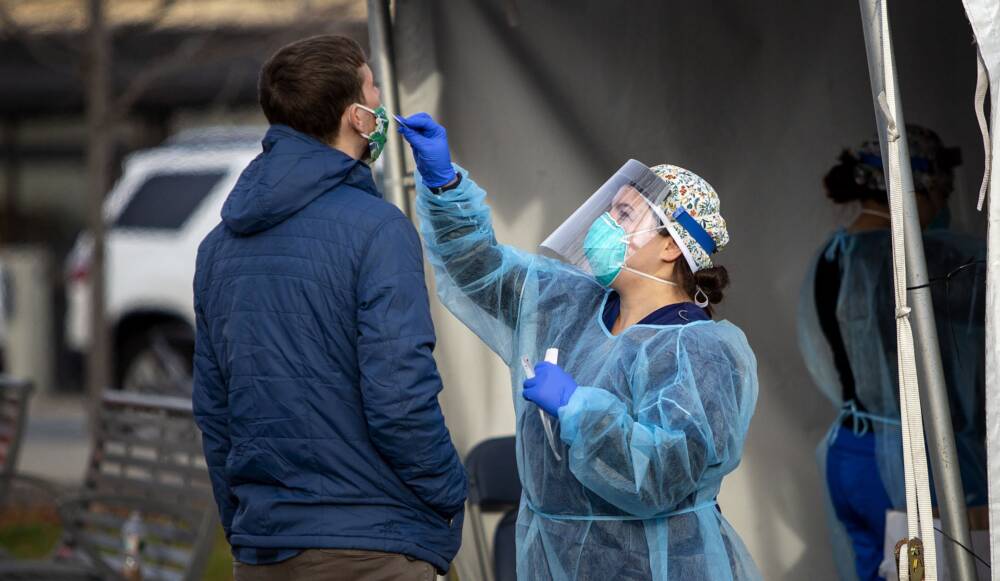Advertisement
Boston's Weekly Health Newsletter
What the end of the COVID public health emergency means in Massachusetts

Editor's Note: This is an excerpt from WBUR's weekly health newsletter, CommonHealth. If you like what you read and want it in your inbox, sign up here
We’re at a major turning point in the COVID era. On Thursday, after more than three years, the state and federal public health emergencies come to an end.
The virus itself is still here. So is the deep sense of loss for all the lives taken by COVID.
Yet after years of contending with so much disease, death, and social and economic disruption, this feels like a significant moment.
“We seem to have entered finally that long-awaited endemic phase of COVID,” said Dr. Cassandra Pierre, associate hospital epidemiologist at Boston Medical Center.
Several pandemic-era policies that allowed the state and federal governments to respond to COVID are about to end. Here are a few of the big changes:
Access to tests
Health insurers will continue to pay for COVID tests ordered by clinicians. But testing for COVID at home will become more expensive for most people. Private health insurers will no longer be required to provide free rapid antigen tests — and Massachusetts’ biggest insurance companies say they will stop doing so. That means members will have to pay out of pocket, about $12 per test.
“When you have to start paying for COVID tests… you may very well think, understandably so, that COVID has disappeared,” Pierre told me.
But that’s not the case, she said: COVID remains a concern, especially for people who are elderly or immunocompromised, or have challenges accessing health care due to poverty or structural racism.
Masking in health care facilities
Since 2020, we’ve become used to wearing masks for our medical appointments, and seeing our health care providers in masks, too. On Friday, masks in health care facilities will become optional.
Hospital leaders and state officials said it’s safe to remove masks now that COVID numbers have fallen to among their lowest points since the pandemic began.
"The risk is extremely low, and bringing the mask mandate down is following the science and the data that are available," Massachusetts Public Health Commissioner Dr. Robbie Goldstein told reporters on Tuesday.
He said state officials will continue to track the virus and adjust policies as circumstances change.
But several patients and public health advocates say they’re concerned that the end of universal masking in health care settings will put people at risk.
Vaccination mandates
COVID vaccination mandates have been perhaps the most controversial strategies for managing the pandemic. Massachusetts, under former Gov. Charlie Baker, and Boston, under Mayor Michelle Wu, required public employees to be vaccinated. Protests and lawsuits ensued — but didn’t stop the mandates from going into effect.
Now, city and state officials are ending these vaccination requirements. Gov. Maura Healey, in a statement announcing the change, said the requirement saved lives. But she added: “We’ve reached the point where we can update our guidance to reflect where we are now.”
Medicaid coverage
Another big change that began in April: the end of the pandemic policy that allowed people to keep Medicaid coverage indefinitely. Hundreds of thousands of people in Massachusetts are expected to have to shift to new insurance plans over the next several months.
Data collection
Beginning Thursday, the CDC also will stop regularly tracking and releasing the number of new COVID infections, since states will no longer be required to report new cases. The CDC will focus instead on COVID hospitalization data.
In Massachusetts, Goldstein said the state will transition to less frequent COVID data collection and reporting. But he said “We're going to continue to track what is going on with COVID-19 and make sure that we know what's happening all across the commonwealth.”
Jennifer Nuzzo, director of the Pandemic Center at Brown University School of Public Health, said she’s concerned that less granular data collection will make it more challenging to track COVID in the future.
She said the country needs to continue using measures like testing and vaccination to keep COVID and other viruses at bay.
“We can’t allow a virus to ravage our society in the way that this virus did,” she told me. “If anything has come out of this pandemic, it’s that we have a lot more understanding of what we can do to prevent that from happening.”
You can read more on the end of the COVID public health emergency from me here and from NPR here.
P.S.— Mother’s Day is just a few days away. Show mom how much you care — and support the news! — by sending Winston Flowers from WBUR. Choose from four beautiful options, and save 10% when you order today.
This article was originally published on May 09, 2023.
